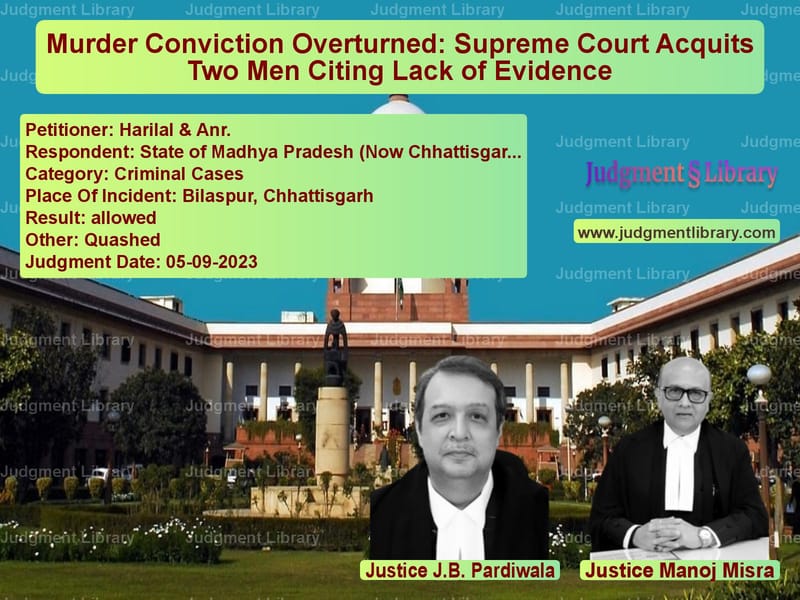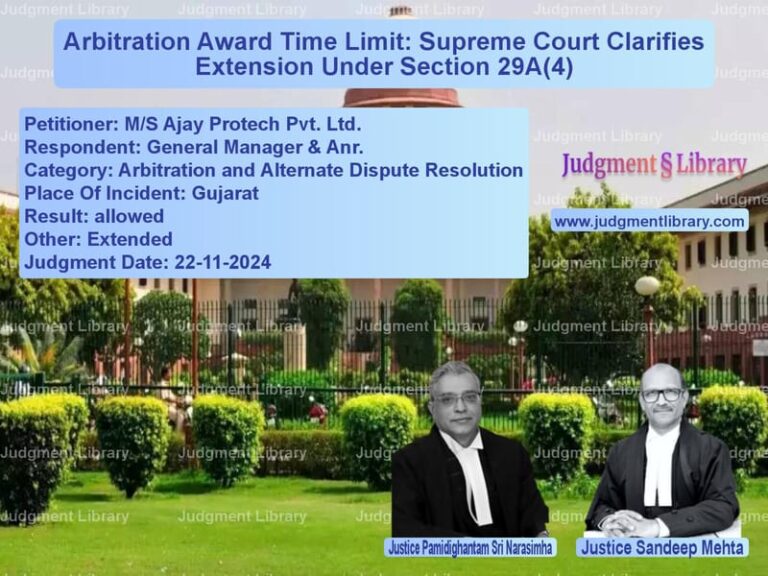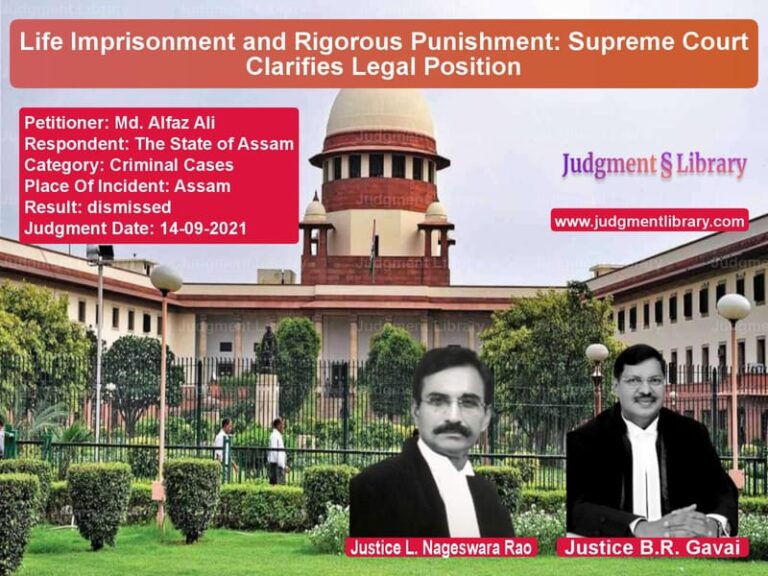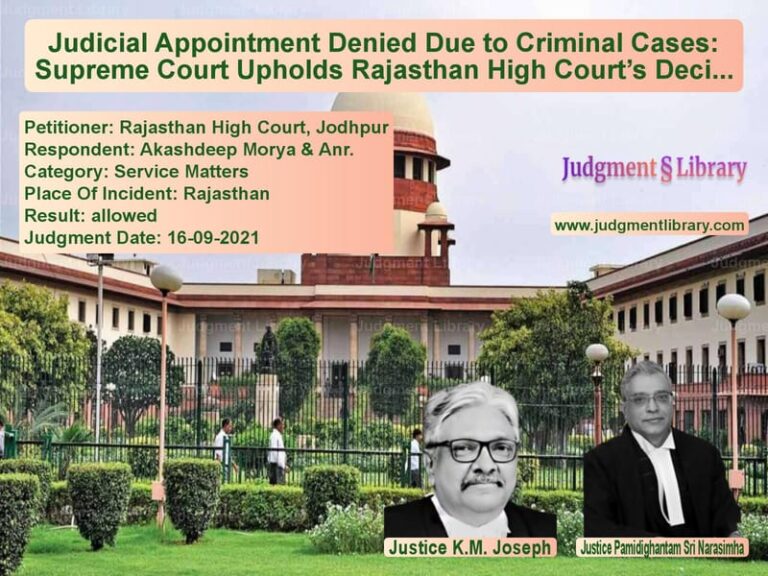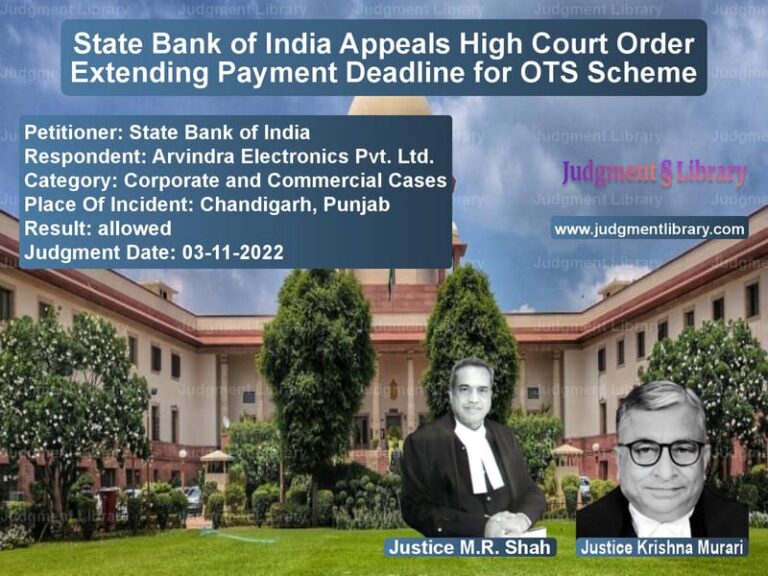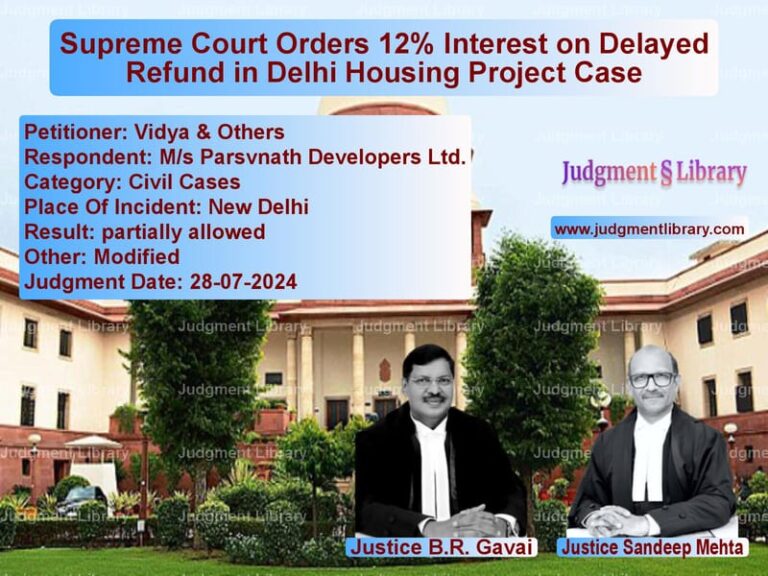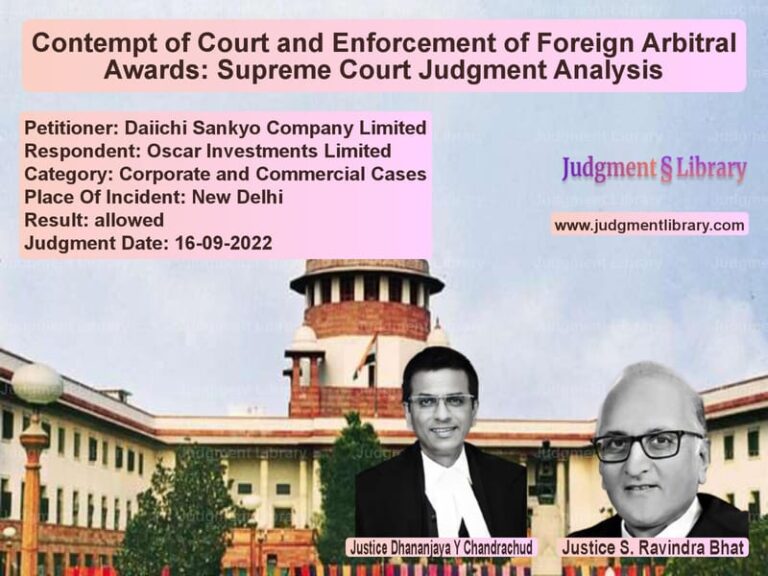Murder Conviction Overturned: Supreme Court Acquits Two Men Citing Lack of Evidence
The Supreme Court in Harilal & Anr. vs. State of Madhya Pradesh (Now Chhattisgarh) ruled on a murder case that had led to the conviction of two accused individuals for life imprisonment under Section 302 of the Indian Penal Code (IPC). The judgment highlighted discrepancies in the prosecution’s case and granted the benefit of the doubt to the accused, ultimately acquitting them.
Background of the Case
The case dates back to August 25, 1989, when Ellahabadiya alias Vijay was allegedly murdered in Bilaspur, Madhya Pradesh (now Chhattisgarh). Three accused—Anshram, Parasram alias Rangnath, and Harilal—were arrested for assaulting the deceased with lathis. The next day, the police registered an FIR based on the statement of Smt. Jugmatibai (PW-9). The trial court convicted all three accused, sentencing them to life imprisonment.
On appeal, the Chhattisgarh High Court upheld the conviction. However, the case reached the Supreme Court after the surviving appellants, Harilal and Parasram, challenged their conviction.
Legal Issues Raised
The Supreme Court had to determine:
- Whether the prosecution had proven beyond reasonable doubt that the accused had committed the murder.
- Whether the evidence, including witness testimonies and medical reports, was reliable.
- Whether the accused were entitled to the benefit of the doubt due to inconsistencies in the prosecution’s case.
Petitioner’s Arguments (Harilal & Parasram)
The petitioners contended:
- The FIR was lodged after significant delay, indicating manipulation.
- The primary eyewitnesses—PW-2 (Sitaram) and PW-6 (Ganesh)—gave inconsistent statements.
- There was no clear motive, and the cause of the fight was unknown.
- The body was found 300 feet away from the alleged place of the attack, raising doubts about the sequence of events.
- The forensic evidence was inconclusive, and no clear link was established between the recovered lathis and the murder.
Respondent’s Arguments (State of Chhattisgarh)
The prosecution maintained:
- There was no delay in lodging the FIR, as the villagers guarded the body overnight before reporting the incident.
- The testimonies of PW-2 and PW-6 corroborated each other and aligned with the medical evidence.
- The accused had been identified at the scene of the crime by reliable eyewitnesses.
- The medical report confirmed that the injuries were inflicted with a blunt object, such as a lathi, which was recovered from the accused.
Supreme Court’s Ruling
The Supreme Court examined the inconsistencies in the prosecution’s case and ruled in favor of the accused, acquitting them due to reasonable doubt.
1. FIR Delay Casts Doubt on Prosecution’s Case
- The FIR was lodged almost 14 hours after the alleged murder.
- The informant, PW-9, stated that no eyewitness informed her of the assailants’ identities, contradicting the prosecution’s claims.
- The Court found this delay significant, as it allowed for potential fabrication of evidence.
2. Inconsistent Testimonies of Eyewitnesses
- PW-2 (Sitaram) initially claimed he saw the attack but only named one accused. His testimony in court contradicted his earlier statement.
- PW-6 (Ganesh) stated that he heard a commotion and then saw the accused attacking the deceased, but he was inconsistent about the number of attackers and their weapons.
- Neither witness explained how the body was moved 300 feet from the alleged scene of the crime.
3. Lack of Corroborating Medical and Forensic Evidence
- The post-mortem report revealed severe injuries, including fractured ribs and brain hemorrhage.
- However, the forensic report did not confirm the presence of human blood on the weapons recovered from the accused.
- A lathi was found near the body, but there was no evidence to prove it belonged to the accused.
4. No Clear Motive or Premeditation
- The prosecution suggested a dispute involving a village woman as the motive, but no concrete evidence supported this claim.
- The Court found that the incident appeared to be a street fight or mob violence rather than a premeditated murder.
Final Judgment
The Supreme Court:
- Acquitted both appellants due to lack of evidence.
- Overturned the High Court’s decision and set aside the trial court’s judgment.
- Ordered the release of the accused unless they were wanted in other cases.
Impact of the Judgment
This ruling sets an important precedent:
- Strict adherence to evidence: Courts must scrutinize delayed FIRs and inconsistent witness testimonies.
- Benefit of the doubt: Accused individuals cannot be convicted based on weak or circumstantial evidence.
- Mob violence cases require clear identification: The judgment highlights the challenges in proving guilt in cases involving multiple potential assailants.
Conclusion
The Supreme Court’s decision in Harilal & Anr. vs. State of Madhya Pradesh (Now Chhattisgarh) underscores the importance of reliable evidence in criminal cases. The acquittal reinforces the principle that conviction must be based on proven facts, not assumptions. This case serves as a reminder that every individual deserves the benefit of the doubt when the prosecution fails to establish guilt beyond reasonable doubt.
Petitioner Name: Harilal & Anr..Respondent Name: State of Madhya Pradesh (Now Chhattisgarh).Judgment By: Justice J.B. Pardiwala, Justice Manoj Misra.Place Of Incident: Bilaspur, Chhattisgarh.Judgment Date: 05-09-2023.
Don’t miss out on the full details! Download the complete judgment in PDF format below and gain valuable insights instantly!
Download Judgment: harilal-&-anr.-vs-state-of-madhya-prad-supreme-court-of-india-judgment-dated-05-09-2023.pdf
Directly Download Judgment: Directly download this Judgment
See all petitions in Murder Cases
See all petitions in Bail and Anticipatory Bail
See all petitions in Custodial Deaths and Police Misconduct
See all petitions in Judgment by J.B. Pardiwala
See all petitions in Judgment by Manoj Misra
See all petitions in allowed
See all petitions in Quashed
See all petitions in supreme court of India judgments September 2023
See all petitions in 2023 judgments
See all posts in Criminal Cases Category
See all allowed petitions in Criminal Cases Category
See all Dismissed petitions in Criminal Cases Category
See all partially allowed petitions in Criminal Cases Category

